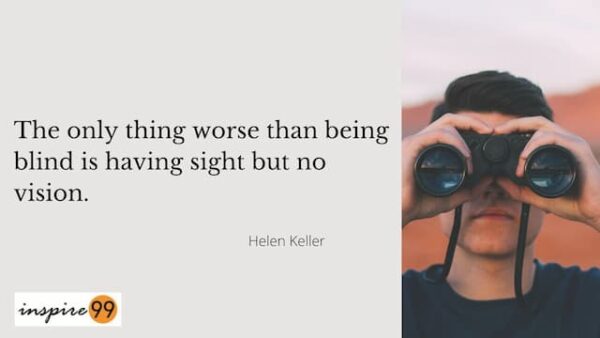In this article, we explore the meaning of Helen Keller’s quote – The only thing worse than being blind is having no vision. As we discuss the meaning of this quote, we also talk about the difference between sight and vision. The beauty of this quote lies in the power of your vision and dreams.
We discuss three things in this article
- Meaning of the quote – the only thing worse than being blind is having no vision
- Difference between sight and vision
- How to create a personal vision for your life
What better to motivate us than a quote from Helen Keller about vision?
The only thing worse than being blind is not having a vision meaning
What is the meaning of – The only thing worse than being blind is not having a vision? In analysis this quote, we need to understand the meaning and influence of vision on your motivation. Vision is closely defined as the mind’s eye – constantly telling you about the purpose of your life and its goals.
We talked about creating a personal vision for your life where the focus was to build your dream into specific areas. Your vision defines the values you stand for as a person. These values will change with time, but they should lead you somewhere or else you can easily go astray without a dedicated purpose.
In other words, it is awful to keep moving along in the name of progress without any clear idea about what you are doing. Most importantly, you need to ask the question – Why am I doing this? Having defined success as a journey rather than a destination, you need to identify what this vision means to you. Further, break this vision or your dream into milestones.
What is the difference between sight and vision
While understanding the meaning of Helen Keller’s quote on vision vs sight, it is important to notice the difference between the two. Often people tend to use this interchangeably. Key differences between sight and vision are:
- Sight is the ability to see things as they are: Vision is the ability to see things beyond the limitations of sight: Vision is beyond eyesight and not limited to the restrictions of reality. You can use your vision to point you in the right direction and create a path for progress. It can only be a dream to chase, but nevertheless something you can consistently aim for and define your personality and values with.
- Vision provides a purpose and clarity of direction: You can argue that sight also provides you with a sense of direction. But the difference between sight and vision is that sight refers to a short term – only for what you can see. Vision refers to the things you cannot see as well but can imagine and feel. This can be as simple as the energy you derive from imagining your dreams or the power which can inspire you to fight amidst odds.
- Vision provides you with an elevated sense and purpose for life: It gives you a purpose which sight fails to. Vision is the long term culmination of all things you’ve done and wants to do going ahead. With this vision, you can create a successful journey for yourself. You need to back your vision with strong ‘Why’s’ which give you a clear purpose and direction. It also gives you the much-needed excitement and energy to do the things you aspire for.
The above summarises key differences between vision and sight while impressing how important it is for you to have a vision for your life.
How to build a vision for your personal life
In this quote, Helen Keller is very clear about the meaning as to why the only thing worse than being blind is having no vision. This quote is largely about you taking control of your life and its values rather than just swimming along.
Through this journey, you are taking control of what your life’s values need to be and why. Use the motivation provided by this quote to investigate your most important values. Break down these values into different segments of your life as we talked about in how to create a personal vision for your life.
It is easy to be sidetracked and fall into the trap of a short term view of the sight and things in front of you. Balance this against your values and personal aspirations. These values will give the clarity your vision demands. Following this clarity, you can break down the vision into goals and corresponding milestones.
The only thing worse than being blind is having sight but no vision.
Helen Keller (Source)
